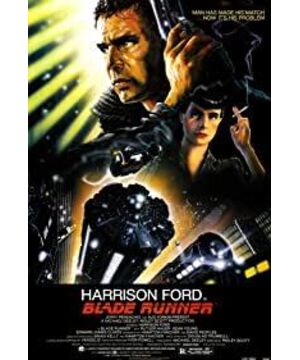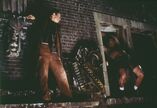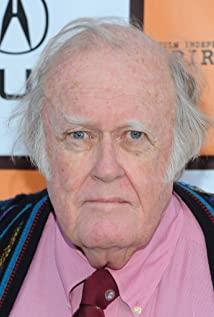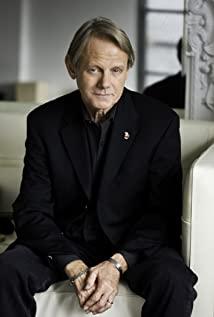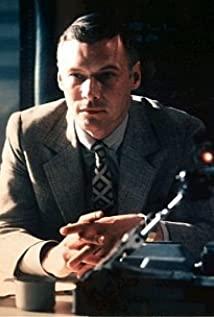There are good reasons to think that Deca is a copyist. When Rachel took the empathy test and was cruelly told that she was a clone and all precious memories were implanted, she asked Deca, "Have you ever tested this humanity test on yourself? "The stay and reaction time of this shot is much longer in that series of shots, long enough to bury the seeds of suspicion. The memory of the copy person is corroborated by photos. The subjective way of Deca's gaze at a series of photos of Lyon and Rachel is exactly the same as the way that Rachel gazes at a series of photos of his deceased wife on Deca's piano. At this time, a huge mystery has enveloped us: Is our memory really a history that has existed, or is it an illusion that has been implanted? Is it possible that we are also cloners? This self-doubt, accompanied by the self-confidence that Deca never doubted, was delayed until the end of the film. We may even wonder, why did Deca never doubt himself? In fact, the “origami man”, the police chief’s little attendant, has been faintly implying his insight into people and that he can represent the part of human introspection. Wherever the copy person can reach, he will leave mysterious origami: a rooster, a person with a tail, so that at the end, Deca sees his own door leaving the origami of the unicorn in his dream. "It turns out that I am also a clone", "It turns out that you already knew it", and "I know that death will come sooner or later" on his face suddenly realized. In this way, when we look back, we can understand the words of the chief of police: "It's too bad she won't live! But then again, who does?" It can also explain the doubts that have been hidden in our hearts: Why does Deca go far beyond Man's physical strength is enough to contend with Roy, a top clone.
This makes sense, but if this movie is for this suspense, wouldn't it be too boring? Scott has carefully set up so many images and double narrative clues, allowing us to solve puzzles and games non-stop. First of all, it is clear that Deca and Roy are the dual protagonists of the film. The narrative time is halfway open. The two clues continue to advance and finally merge together to become the climax of the two masters. In terms of structure, they form an obvious correspondence. relation. Therefore, the understanding of Deca should start with the understanding of Roy.
Roy and his clone friend, symbolize the fallen angel from heaven. The prop of the charming dancing girl Zola is a snake, and the tattoo on her neck is also a snake. The place where she was hit by Deka happens to be two flanks-the place with wings. Roy and his party are descending from outer space to the earth. Corresponding to it is the soaring of the pigeon when Roy died-the white and flawless soul finally soared back to heaven. When Eve and Adam were expelled from the Garden of Eden, they became mortal mortals instead of immortal gods. Roy's request to Dr. Taylor, the creator of him, to let them get rid of death, it is the arrogance of mortal mortals to immortal gods, a short life's desire for eternity, this is the most tragic story in Greek mythology. origin. (The replicator's perfect figure is like a Greek, and Taylor's company is also designed to look like a Greek temple.) After Dr. Taylor expressed technical incompetence, Roy pulled out his eyes because of hatred. The eye, an important organ, reappears in the film and is always associated with cognitive doubts; Oedipus blinds his eyes not only because he "cannot see" the intricate fate behind his life, but also arrogates God for him. Roy is full of mockery of Taylor's punishment, because Roy is actually the ignorant one. Taylor actually said to him, "You make this short life dazzling, it's enough." Roy at that time, like all human beings, didn't understand this sentence because he yearned for eternal life. He behaves like a devil who has fallen into hell, killing Sebastian and the innocent Taylor who have helped him indiscriminately, all because of his inflated greed. Do you still remember his howling wolf? At the beginning of "Divine Comedy: Hell", Dante was chased by a female wolf deep in the woods. The image of the wolf symbolizes greed. "Jeremiah" Chapter 5 says: "Idcirco percussit eos leo de silva, lupus ad vesperam vastavit eos..." "Book" Chapter 2 says: "omne quod est in mundo, concupiscentia carnis, et concupiscentia oculorum est, et superbia vitae: quae non est ex patre, sed ex mundo est.
I've seen things you people wouldn't believe.
Attack ships on fire off the shoulder of Orion.
I've watched c-beams glitter in the dark near the Tannhauser Gate.
All those ... moments will be lost in time, like tears...in rain.
Time to die. (Every time I hear this, I cry into a stupid TT)
Roy's image has a transformation from the devil-Christ. At the last moment, he completed the arc of growth, accepted the innate destiny of death, recognized that life is like Heraclitus in time, and gave himself a very high life. The value of romanticism. He replaced greed and desire with understanding and acceptance, and more importantly, just like Jesus whose palm was pierced by a nail, he made atonement for those who wanted to hurt him with compassion. This paragraph of Deca’s words actually comes from William Blake’s "Innocent Herald" ("Put the infinity in your palm, eternity in the moment" is the beginning of it), "Every tear from every eye/ Becomes" a babe in eternity". "Innocent Herald" is a poem to persuade people to believe in religion. The screenwriter borrowed many images from it: owls, doves, and even plots of revenge.
Looking at Roy and his clone friends, they are all "human, too human." Although they are perfect, they cannot overcome the memory, destiny, and death designed by humans-isn't this the most accurate generalization of human being? Deca represents people and the audience before the silver screen. Although our lives are longer than clones, in history it is nothing more than death and fleeting; it is because of the decay of life that we have continuous The inflated greed and desire; the origami left by the "origami man" is like daily introspection, which always makes us feel the anxiety and anxiety of being "understood" and "designed". The police chief’s sentence "It's too bad she won't live! But then again, who does?" is a generalization of human beings that are doomed to not escape their fate.
From the above analysis, "Blade Runner" is undoubtedly the most classic masterpiece in posthuman films. The film no longer repeats the anthropocentrism, the magic weapon of Hollywood, but through copying humans to let us face the smallness and fragility of human beings. At this time, our human "creator" (not God) has broken away from the secular religious meaning and has become metaphysical. significance. It is meaningless to ask if Deca is a copy of human beings. Scott only uses a copy of human framework to tell the myth of human beings. How can we survive such a "copy" postmodern horror? Roy's words gave a helpless but noble answer. Because of this, in the Heraclitus and his like, we can also see the flashing, jumping light of human nature, and remind us over and over again of Nietzsche's superman, Heidegger's life to death. May we no longer have greed when we say Time to die, but the same nobility and elegance.
View more about Blade Runner reviews


